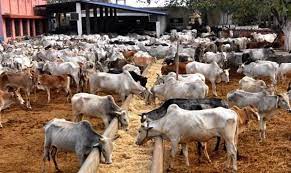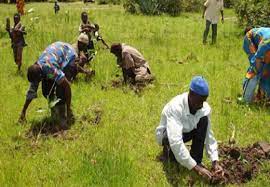The Minister of Water Resources, Engr. Suleiman Adamu, has revealed that it is the state government that has the responsibility of providing water infrastructures and portable water for its citizens in the state.
He said the primary responsibility for water supply rests with the states that is why the federal government does not run Water Corporation, saying it is not the role of the Federal Government to provide water but to provide bulk water and manage the water resources of this country.
This is in the light of the recent report by a medium which alleged that 73% Of Nigeria’s population uses contaminated water.
The Minister through the Director, Press and Public Relations, Mrs Kenechukwu Offie said whatever the Federal Government through the ministry is doing is just an intervention to complement the efforts of the states, but that most states have failed to invest in the sector.
Speaking on the achievement of the Ministry in line with the nine priority areas of the administration, the minister said the government has made considerable progress in providing access to potable water in Nigeria.
According to him, the government has developed 6,761 water schemes across urban, small town and rural areas of the country producing 794,334,000 litres per day and serving 32,008,600 Nigerians.
“In an effort to boost agriculture and food security of the nation, the ministry has completed 10 irrigation schemes thereby increasing the actual irrigated area from 70,000 Ha in 2015 to 138,000 Ha presently.
“To support the country’s energy sufficiency, twelve (12) dams were completed with combined water impoundment capacity of 795.1 MCM and hydropower generation of 110 MW. Efforts have also been put in place to utilize hydropower potential of 3,466 MW under PPP arrangement.
“Under Sanitation activities, 3,402 facilities were constructed in Institutions and Public places (markets, schools, motor parks, IDP camps etc.). Also, a national survey conducted under the 2021 WASHNORM III reported a national access to basic drinking water supply services at 67% and access to basic sanitation services stood at 46%.
“Nigeria has over 400 dams scattered across the county. These dams have the capacity to provide 11.2 billion cubic metres (BCM) of water for irrigation, 900 MCM for water supply and 18BCM for hydropower generation.
“From 2016 till date, 12 dams have been completed out of which 5 dams with hydropower potential are available for PPP,” he said.According to him, Nigeria’s surface and ground water resources are estimated at above 250 billion cubic meters, translating to 1,800 m3/capita per year of renewable water resources being available for the populace.This according to Adamu is more than the 1,000 m3/capita/year benchmark for water poor countries. However, Nigeria is ranked as an Economic Water Scarce Country, due to lack of adequate investment and management to meet demands.He said Nigeria has potential of 3.14 million Ha of irrigation land, 500,000Ha is planned for development by FGN by 2030. Actual Irrigated area developed is presently 138,000 HaAnd that private sector and State Governments are expected to develop additional 1,000,000 Ha of irrigation land and associated infrastructure by 2030.“Nigeria aspires to meet the target SDG 6.2 for sanitation with the achievement of universal and equitable access to safely managed sanitation services for all by 2030.“Access to basic sanitation services in Nigeria stands at 46% according to the 2021 WASHNORM report.“Nigeria is also committed to ending Open Defecation by 2025. So far, 84 Local Government Areas of the country have been certified open defecation free.“The planned expenditure budget of FGN in the 2013 National Water Resources Master Plan (MP2013) was projected at N4.9 trillion Naira.“Capital expenditure – N1.5 trillion Naira (28.5% of total budget) anticipated revenues of FGN excluding the debts such as government bonds – 3.6 trillion Naira revenues from income taxes and value added taxes -14%,” he explained.He stated further that from 2014 till date, expenditure budget release is 580.38 billion Naira excluding States and Local Governments, but that funding gap is still N4.3 trillion Naira, which is huge.He however explained that additional funding is required to develop water infrastructure in Nigeria as FGN budgetary allocations are no longer adequate based on current realities like increase in population, inflation, exchange rates etc.




